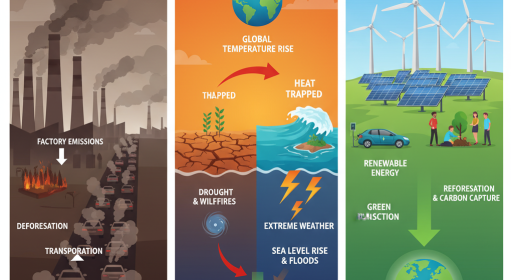Climate change is profoundly altering Earth’s natural systems, leading to significant consequences for ecosystems, increasing the frequency and severity of natural disasters, and posing substantial risks to human health. Understanding these impacts is crucial for developing effective mitigation and adaptation strategies.
Impact on Ecosystems
Ecosystems worldwide are experiencing unprecedented stress due to climate change:
- Biodiversity Loss: Rising global temperatures are causing shifts in species distributions, leading to habitat loss and increased extinction rates. For instance, coral reefs are bleaching due to warmer ocean temperatures, threatening marine biodiversity.
- Forest Decline: Increased frequency of wildfires, pest infestations, and diseases are resulting in widespread forest die-offs. These changes not only reduce biodiversity but also diminish forests’ capacity to sequester carbon, exacerbating climate change.
- Aquatic Ecosystem Disruption: Altered precipitation patterns and increased evaporation rates are affecting freshwater systems, leading to reduced water quality and availability, Increase in Natural Disasters
Climate change is intensifying the severity and frequency of natural disasters:
- Extreme Weather Events: Warmer temperatures contribute to more intense and prolonged heatwaves, hurricanes, and storms, leading to significant economic and human losses.
- Floods and Droughts: An accelerated water cycle results in heavier rainfall in some regions, causing floods, while others experience prolonged droughts due to increased evaporation. Both extremes have devastating effects on agriculture, infrastructure, and livelihoods.
- Sea-Level Rise: Melting polar ice and thermal expansion of seawater are causing sea levels to rise, leading to coastal erosion, saltwater intrusion, and displacement of coastal communities.
Human Health Implications
The health impacts of climate change are multifaceted and far-reaching:
- Heat-Related Illnesses: Increased temperatures elevate the risk of heat exhaustion and heatstroke, particularly among vulnerable populations such as the elderly and those with pre-existing health conditions.
- Respiratory Issues: Higher temperatures and increased levels of atmospheric CO₂ contribute to poorer air quality, exacerbating respiratory conditions like asthma and increasing the prevalence of allergies.
- Vector-Borne Diseases: Changing climate conditions expand the habitats of disease-carrying vectors such as mosquitoes and ticks, leading to the spread of illnesses like malaria and Lyme disease into new regions.
- Mental Health Challenges: The trauma associated with extreme weather events, displacement, and loss of livelihoods contributes to increased incidences of anxiety, depression, and post-traumatic stress disorder.
Addressing the Challenges
Mitigating the impacts of climate change requires a comprehensive approach:
- Reducing Greenhouse Gas Emissions: Transitioning to renewable energy sources, enhancing energy efficiency, and implementing sustainable land-use practices are critical to lowering emissions.
- Enhancing Resilience: Investing in infrastructure that can withstand extreme weather events, developing early warning systems, and promoting adaptive agricultural practices can help communities better cope with climate-related challenges.
- Protecting Public Health: Strengthening healthcare systems to respond to climate-induced health issues, promoting public awareness, and ensuring access to clean water and nutritious food are essential for safeguarding human health.
Understanding and addressing the interconnected impacts of climate change on ecosystems, natural disasters, and human health is imperative for building a sustainable and resilient future.




